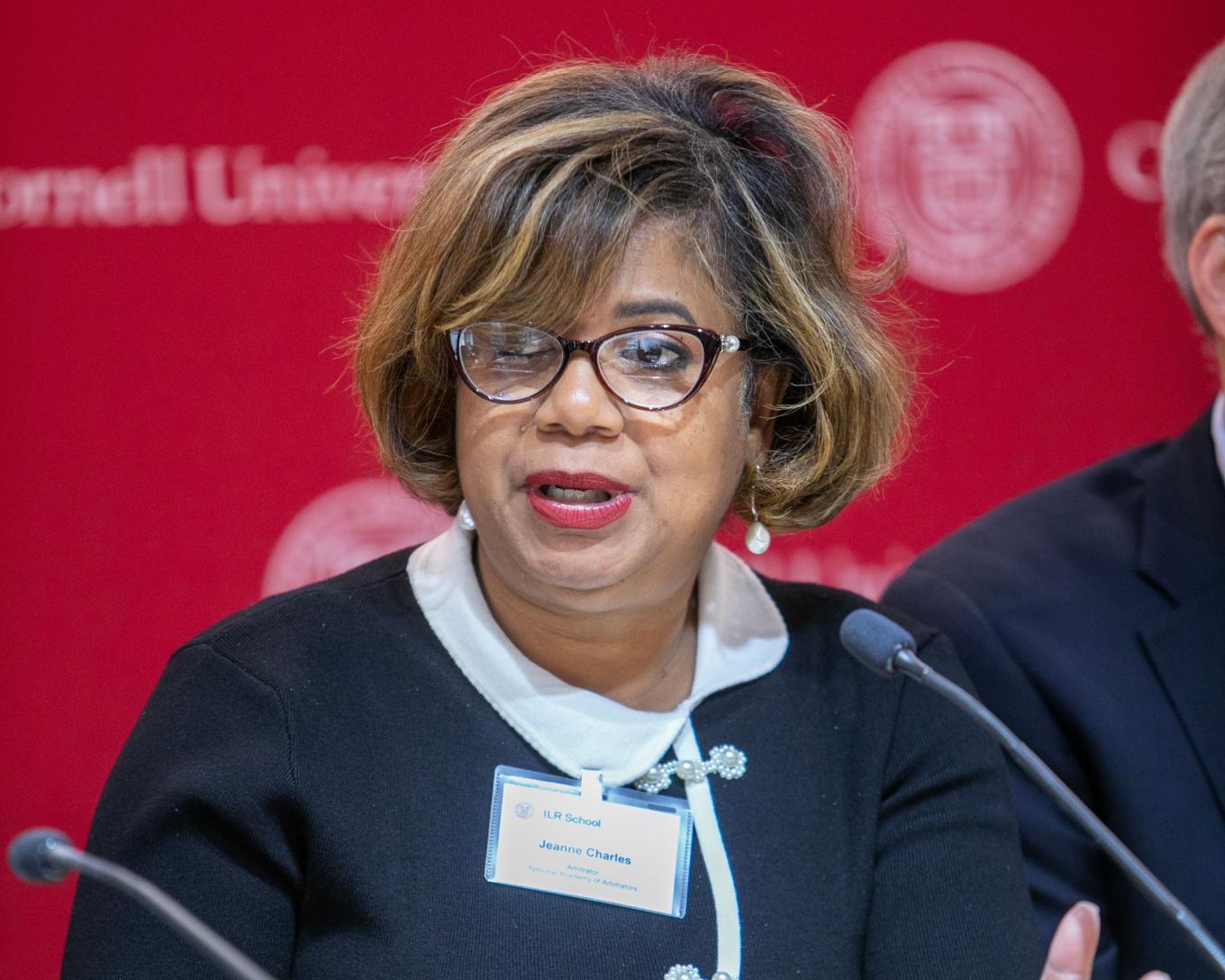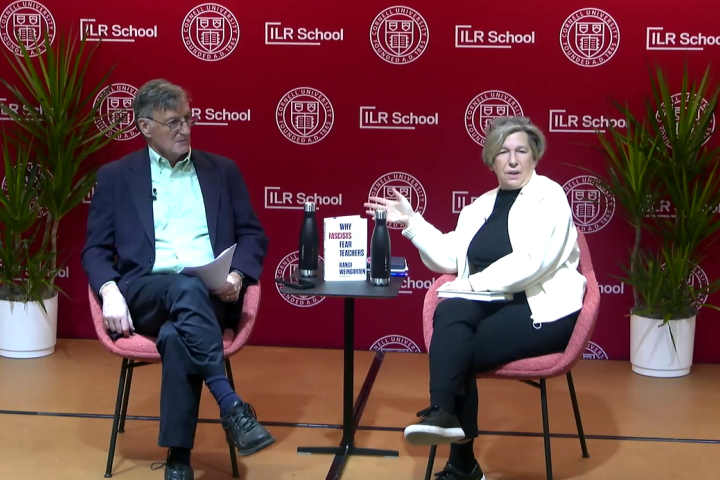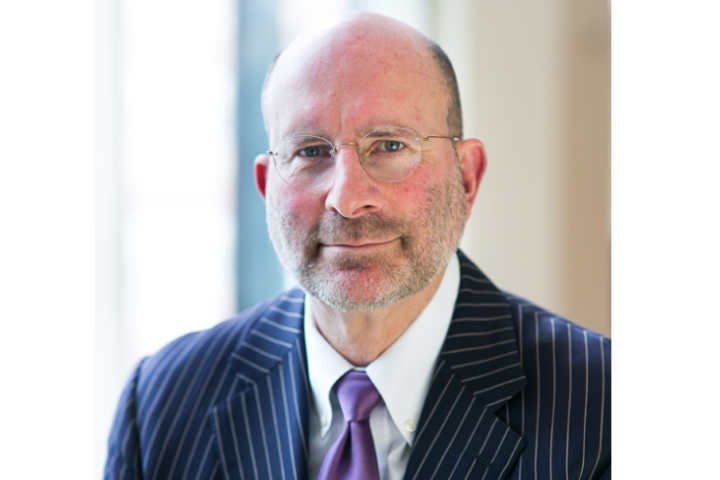
Scheinman Institute Conference Works Toward Creating An Inclusive Next Generation of Neutrals
Recently, the Scheinman Institute on Conflict Resolution in association with the National Academy of Arbitrators (NAA) surveyed NAA members on a number of issues associated with the workplace arbitration and mediation profession. One key finding was that the membership of the organization was overwhelmingly white, male and older. This lack of diversity in the neutral profession is not new and has been the subject of debate for some time. To work towards making the next generation of neutrals (in arbitration, a neutral is a third party who makes a binding decision while mediators are advisory) more inclusive, on April 20th and 21st, 2023, the Institute partnered with the NAA to host a major national conference, held at the ILR conference center in New York City, where the causes for the current workplace neutral demographic crisis were addressed, and potential solutions were presented.
Harry C. Katz, Director of the Scheinman Institute and Jack Sheinkman Professor of Collective Bargaining, opened the conference by noting that with the looming retirement wave among senior neutrals, the need for a new group of arbitrators and mediators who reflect the diversity of the current workplace is critical. The Scheinman Institute, housed in Cornell’s ILR School, trains more students in mediation and arbitration than any other school in the United States. It has been recognized as the world’s preeminent institute focused on workplace conflict resolution.
Participants in the conference included experienced neutrals who handle cases in a variety of industry sectors and governmental units, executives from major businesses such as the US postal service, United Airlines, and Con Edison who oversee labor relations for their organizations, representatives from key governmental and labor organizations such as the Federal Mediation and Conciliation Service (FMCS), the New York State Employment Public Relations Board (NYS PERB), the National Mediation Board, the United Federation of Teachers (UFT) and the Service Employees International Union (SEIU). Also represented were officials of the organizations that administer workplace dispute resolution such as the American Arbitration Association (AAA), JAMS (the world’s largest alternative dispute resolution provider) the event’s co-host, the NAA, as well as faculty from the Scheinman Institute.
Homer C. La Rue, President of the NAA, called the conference an historic moment when the alternative dispute resolution community needed to formulate a plan for a more inclusive arbitration and mediation profession. He argued that a key strength of the neutral community historically has been that the parties found them to be credible based on their understanding of workplace issues and interests. The alternative dispute resolution community, however, now faces an existential risk of appearing to be illegitimate. That illegitimacy emanates from the fact that the decision-makers—arbitrators and mediators —are not perceived to represent the full range of available talent and ability.
He added that this conference gives us the opportunity to disrupt the legacy method of selecting arbitrators and mediators. There are available methods for reversing that lack of diversity. Inclusion can be achieved with the same tools traditionally used to obtain any other business or policy goal. We collect data. We design and implement remedial measures. We apply a metric to measure success. We are persistent in the pursuit of the goal of inclusion.
Alexander Colvin, Dean of the ILR School, addressed the participants and noted that his own academic research into workplace conflict has shown how the quality of neutrals matters, and that to sustain the highest professional standards going forward, it is critical for the development of new arbitrators and mediators who reflect the diversity of the workforce.
The conference focused on three key steps involved in bringing aboard a next generation of inclusive neutrals: 1. Making more people aware of the profession. This would include practitioner organizations and schools such as ILR making a concerted effort to inform students and others about the neutral profession. 2. Teaching people how to become neutrals. For example, the Scheinman Institute offers a 15-month program in how to become a labor arbitrator. 3. Creating opportunities for those new to the field to work on basic cases and establish their credentials with the parties.
A panel of expert arbitrators addressed these issues.
Arbitrator Scott Buchheit, a panel member and member of the Scheinman Institute Board of Advisors, highlighted the depth of the problem when he pointed out that seventy percent of the members of the NAA are above seventy years old. He added that for the profession to stay relevant, the current generation of neutrals by necessity must be active participants in recruiting and training a new generation.
Part of the issue of recruiting an inclusive group of neutrals is that “we have to get to a place as a society that we operate from a mindset of inclusion not because it is required but because it is desired,” observed NAA member Jeanne Charles.
It was pointed out by Alan Symonette, President-elect (24-25) of the NAA, that while there have been efforts in the past to increase diversity in the neutral profession, the “needle has not moved.” He also addressed the economic concerns of young neutrals just starting, who have understandable reservations about the ability to make a living as a neutral without the experience or connections to warrant a steady flow of cases.
Sarah Miller Espinosa, a member of the NAA and Scheinman Institute Senior Associate, asserted her belief that a number of promising candidates, candidates who could help build an inclusive next generation of neutrals, are lost in the early contemplation/exploration phase, and one way to mitigate these challenges would be to provide greater career path clarity, support and resources at the exploration and early career phase.
Founder of the Scheinman Institute on Conflict Resolution, Martin Scheinman, discussed the genesis and goals of the Institute. These included providing ongoing skills and training for aspiring neutrals, and perhaps more importantly, the development of a “farm” system to cultivate young people, whether they be undergraduates, graduate students, law students or others, to appreciate the work of neutrals as a noble profession and hopefully to consider joining the field. He emphasized that current and past efforts on the part of the workplace neutral profession to attract a younger, more diverse group of professionals interested in entering the field have failed, and that new innovative approaches are required.
A video is available to view the discussion of this panel.
In order to realize the goals of the conference, the Scheinman Institute and the NAA proposed creating a Next Generation of Neutrals Consortium. Its purpose would be to administer a fellowship program committed to outreach and recruitment of new neutrals including those of emerging identities, the training, support and mentorship of fellows and to assist fellows in gaining or enhancing acceptability and income through appointments to early career cases.
Eric Mennel, Director of Labor Relations and Legal Strategy at United Airlines, who attended the conference, summed up the experience this way: “There could be no more important work in our field than identifying and training our next generation of labor arbitrators. The Scheinman Institute is a leader in the effort of bringing labor and management leaders together to collaborate on how we must evolve.”












